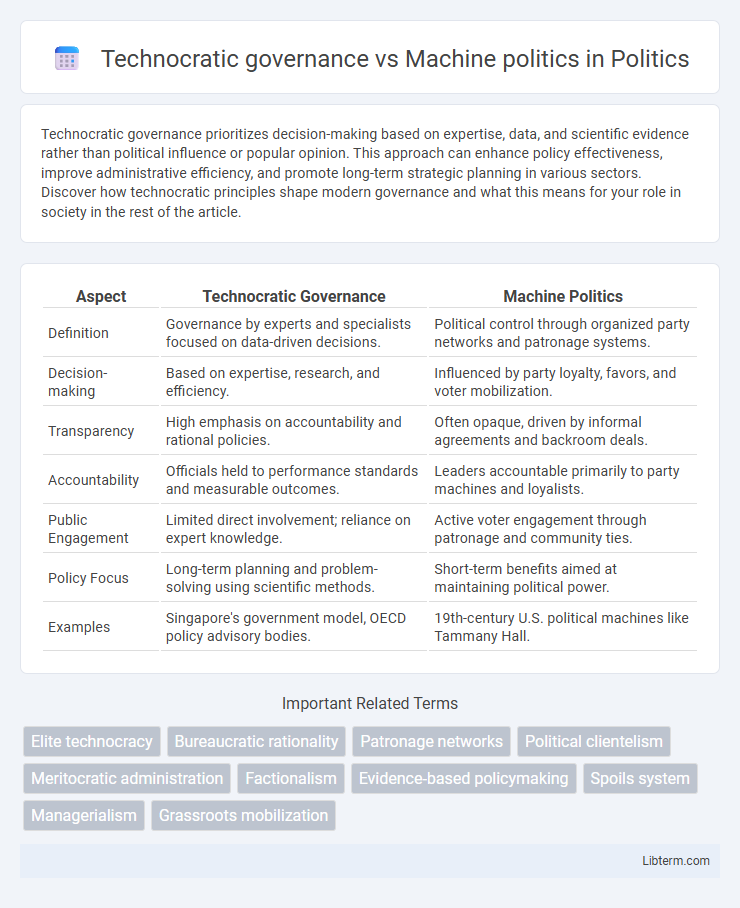Technocratic governance prioritizes decision-making based on expertise, data, and scientific evidence rather than political influence or popular opinion. This approach can enhance policy effectiveness, improve administrative efficiency, and promote long-term strategic planning in various sectors. Discover how technocratic principles shape modern governance and what this means for your role in society in the rest of the article.
Table of Comparison
| Aspect | Technocratic Governance | Machine Politics |
|---|---|---|
| Definition | Governance by experts and specialists focused on data-driven decisions. | Political control through organized party networks and patronage systems. |
| Decision-making | Based on expertise, research, and efficiency. | Influenced by party loyalty, favors, and voter mobilization. |
| Transparency | High emphasis on accountability and rational policies. | Often opaque, driven by informal agreements and backroom deals. |
| Accountability | Officials held to performance standards and measurable outcomes. | Leaders accountable primarily to party machines and loyalists. |
| Public Engagement | Limited direct involvement; reliance on expert knowledge. | Active voter engagement through patronage and community ties. |
| Policy Focus | Long-term planning and problem-solving using scientific methods. | Short-term benefits aimed at maintaining political power. |
| Examples | Singapore's government model, OECD policy advisory bodies. | 19th-century U.S. political machines like Tammany Hall. |
Introduction to Technocratic Governance and Machine Politics
Technocratic governance centers on decision-making by experts and specialists who apply scientific methods and technical knowledge to public policy, aiming for efficiency and evidence-based solutions. Machine politics relies on organized political groups that wield power through patronage, loyalty, and controlling voter blocs, prioritizing political influence over expertise. These contrasting approaches highlight the tension between meritocratic administration and partisan-driven governance in shaping political systems.
Historical Evolution of Governance Models
Technocratic governance emerged in the early 20th century as a response to inefficiencies in traditional political systems, emphasizing expertise and scientific management in decision-making processes. Machine politics, rooted in the late 19th-century urban America, relied on political organizations and patronage networks to control votes and maintain power through party loyalty and grassroots mobilization. The historical evolution of governance models reveals a shift from patronage-driven machine politics to technocratic approaches prioritizing specialized knowledge and evidence-based policies.
Core Principles of Technocracy
Technocratic governance prioritizes decision-making based on expertise, scientific data, and rational analysis, ensuring policies are driven by empirical evidence rather than political ideologies or popular opinion. Core principles of technocracy include meritocracy, efficiency, and specialization, emphasizing the role of trained professionals in managing complex social and economic systems. This stands in contrast to machine politics, which relies on patronage, party loyalty, and electoral influence rather than expert knowledge.
Defining Features of Machine Politics
Machine politics is characterized by a hierarchical, party-based organization that relies on patronage and control over votes to maintain power within a specific geographic area. It emphasizes personal loyalty, rewards, and the distribution of resources to supporters through a centralized leadership, often known as a political boss. Unlike technocratic governance, which prioritizes expertise and rational decision-making, machine politics thrives on networks of influence and transactional relationships to secure political dominance.
Decision-Making Processes Compared
Technocratic governance relies on expert knowledge and data-driven analysis to guide policy decisions, emphasizing efficiency and rational problem-solving in decision-making processes. Machine politics depends on political patronage, loyalty networks, and grassroots mobilization, often prioritizing short-term gains and power consolidation over technical expertise. The contrast highlights technocracy's systematic approach versus machine politics' reliance on interpersonal influence and pragmatic negotiation.
Impact on Public Policy and Administration
Technocratic governance emphasizes expertise and data-driven decision-making, leading to more efficient and evidence-based public policy and administration. Machine politics relies on patronage and political influence, often resulting in policies shaped by loyalty rather than merit, which can undermine administrative effectiveness and transparency. The impact on public administration is seen in technocratic systems producing streamlined services, while machine politics fosters bureaucratic inefficiency and potential corruption.
Democratic Legitimacy and Accountability
Technocratic governance emphasizes expertise and evidence-based decision-making, enhancing policy effectiveness but often facing criticism for limited democratic legitimacy due to reduced citizen participation. Machine politics relies on organized party structures and patronage networks, which may bolster electoral accountability but risk perpetuating clientelism and undermining transparent governance. Balancing technocratic efficiency with the inclusive accountability mechanisms of machine politics remains crucial for maintaining democratic legitimacy.
Challenges and Criticisms of Each Model
Technocratic governance faces challenges such as limited public participation and the risk of technocratic elitism, which can alienate citizens and undermine democratic accountability. Machine politics often encounters criticism for fostering corruption, patronage, and lack of transparency, resulting in governance that prioritizes political survival over effective policy-making. Both models struggle to balance expertise with inclusivity, leading to ongoing debates about legitimacy and responsiveness in political decision-making.
Contemporary Examples and Case Studies
Technocratic governance emphasizes decision-making by experts with specialized knowledge, as seen in Singapore's management of urban planning and public health, where data-driven policies have enhanced efficiency and public trust. In contrast, machine politics relies on party loyalty and patronage networks, exemplified by Chicago's Democratic political machine, which maintained control through grassroots mobilization and patronage despite critiques of corruption. Contemporary case studies highlight that technocratic models often lead to transparent, evidence-based policy outcomes, whereas machine politics may prioritize political stability and community engagement at the cost of institutional reform.
Future Prospects for Governance Models
Technocratic governance emphasizes expert-driven decision-making, leveraging data analytics and artificial intelligence to optimize policy outcomes and enhance administrative efficiency. Machine politics relies on party organizations and patronage networks, often prioritizing electoral mobilization over objective solutions, which may hinder long-term governance sustainability. Future prospects suggest a hybrid model integrating technocratic precision with inclusive political engagement could address complex societal challenges while maintaining democratic accountability.
Technocratic governance Infographic

 libterm.com
libterm.com